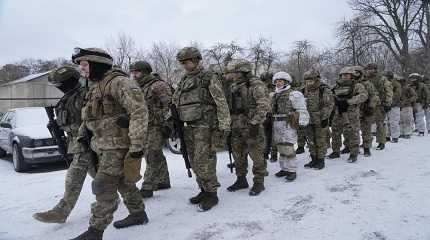
KYIV/SLOVIANSK, Ukraine, June 9 (Reuters) - Ukrainian troops claimed on Thursday to have pushed forward in intense street fighting in the eastern city of Sievierodonetsk, but said their only hope to turn the tide was more artillery to offset Russia's massive firepower.
In the south, Ukraine's defence ministry said it had captured new ground in a counter-attack in Kherson province, aiming at the biggest swathe of territory Russia has seized since its invasion in February.
The battle amid the ruins of Sievierodonetsk, a small industrial city, has become one of the war's bloodiest, with Russia concentrating its invasion force there. Both sides claim to have inflicted massive casualties.
Sievierodonetsk and its twin city Lysychansk on the opposite bank of the Siverskyi Donets river are the last Ukrainian-held parts of Luhansk province, which Moscow aims to seize as one of its principal war objectives.
In a rare update from Sievierodonetsk, the commander of Ukraine's Svoboda National Guard Battalion, Petro Kusyk, said Ukrainians were drawing the Russians into street fighting to neutralise Russia's artillery advantage.
"Yesterday was successful for us - we launched a counteroffensive and in some areas we managed to push them back one or two blocks. In others they pushed us back, but just by a building or two," he said in a televised interview.
"Yesterday the occupiers suffered serious losses - if every day were like yesterday, this would all be over soon."
But he said his forces were suffering from a "catastrophic" lack of counter-battery artillery to fire back at Russia's guns.
Getting such weapons would transform the battlefield, allowing the Ukrainians to fend off Russian artillery, he said.
"Even without these systems, we are holding on fine. There is an order to hold our positions and we are holding them. It is unbelievable what the surgeons are doing without the proper equipment to save soldiers' lives."
Sievierodonetsk Mayor Oleksandr Stryuk said on Thursday around 10,000 civilians were still trapped inside the city - around a tenth of its pre-war population.
In his nightly video address to the nation, President Volodymyr Zelenskiy said the fate of the Donbas region was being decided in Sievierodonetsk, "a very brutal battle, very tough, perhaps one of the most difficult throughout this war."
To the west of Sievierodonetsk, Russia is pushing from the north and south, trying to trap Ukrainian forces in the Donbas region comprising Luhansk and neighbouring Donetsk province, blasting Ukrainian-held towns in their path with artillery.
In Soledar, a salt-mining town near Bakhmut close to the front line, buildings had been blasted into craters.
Remaining residents, mostly elderly, were sheltering in a crowded cellar. A woman peeled potatoes and swatted away flies. Men lay asleep on cots. Kateryna, 85, curled up under a blanket, her hair wrapped in a scarf.
"It will be as God shall give," she said as the cellar was filled with the sound of barking dogs.
Antonina, 65, had ventured out to see her garden. "We are staying. We live here. We were born here." She sobbed: "When is it all going to end?"
KHERSON COUNTER-OFFENSIVE
In the south, Moscow is trying to impose its rule on a tract of occupied territory spanning Kherson and Zaporizhzhia provinces, where it has installed proxy authorities who say they are planning referendums to join Russia.
The Ukrainian Defence Ministry said on Thursday its forces had won back some territory in a counter-offensive in Kherson.
It gave no details but said the Russian forces had "suffered losses in manpower and equipment", mined territory as they were pushed back and erected barricades.
Ukraine had reported a counter-offensive in Kherson last week, claiming to have seized ground on the south bank of the Inhulets river forming a boundary of the province. The situation could not be independently confirmed.
Thousands of people have been killed and millions have fled since Moscow launched its "special military operation" to disarm and "denazify" its neighbour on Feb. 24. Ukraine and its allies call the invasion an unprovoked war of aggression.
Ukraine is one of the world's biggest grain and food oil exporters, and international attention has focused in recent weeks on the threat of international famine seen as caused by Russia's blockade of Ukraine's Black Sea ports.
"Millions of people may starve if the Russian blockade of the Black Sea continues," Zelenskiy said on Thursday in televised remarks.
Moscow blames the global food crisis on Western sanctions against Russia, which it says are restricting its own grain exports. It says it is willing to allow Ukrainian ports to reopen for exports if Ukraine removes mines and meets other conditions. Kyiv says such offers are empty promises.
Turkey, a NATO power with good relations with both Kyiv and Moscow and control of the outlet to the Black Sea, has tried to mediate, hosting Russia's Foreign Minister Sergei Lavrov for talks on Tuesday.
The grain crisis took front stage at a meeting of the OECD group of developed countries in Paris.
"We need to unblock the millions of tonnes of cereals that are stuck there because of the conflict," Italian Prime Minister Mario Draghi said in a speech. "We have to offer President Zelenskiy the assurances he needs that the (Black Sea) ports will not be attacked."




